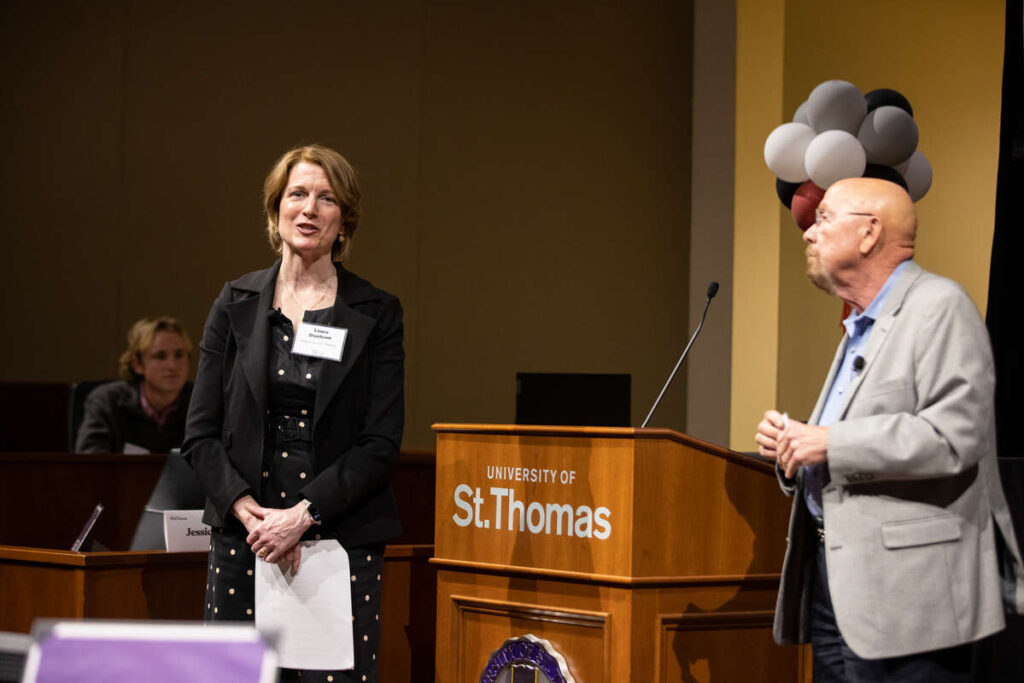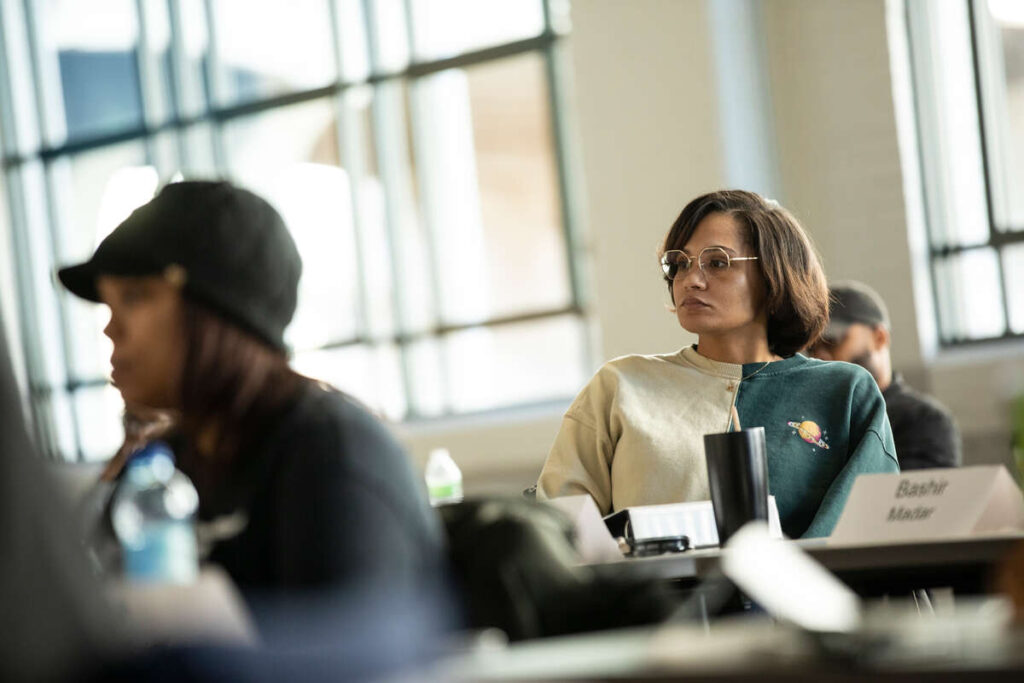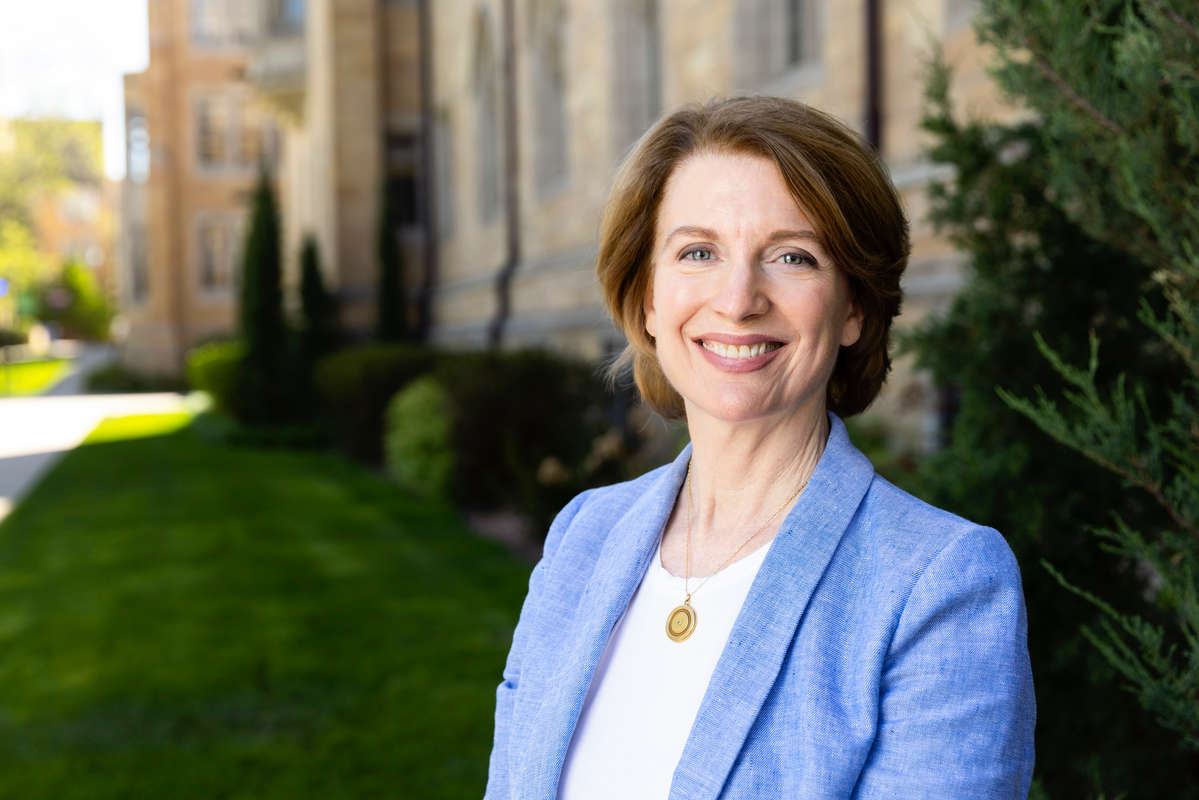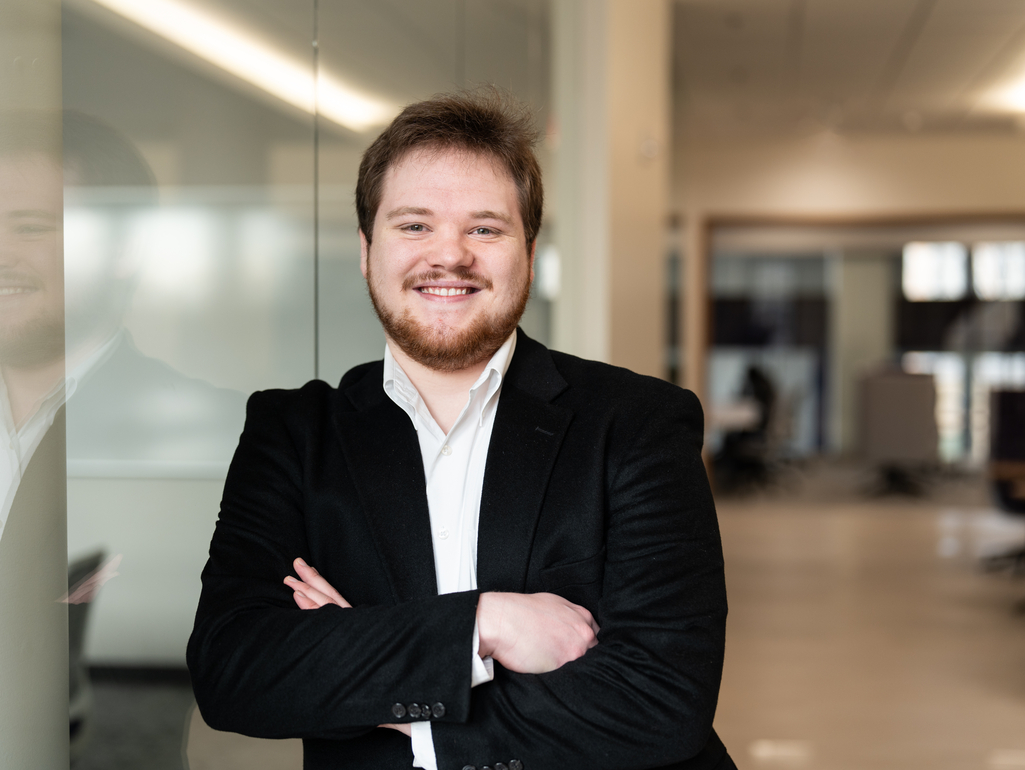Since transitioning from associate dean of the Schulze School of Entrepreneurship to dean of Opus College of Business on July 1, Dr. Laura Dunham was busy preparing for the academic year.
The Newsroom recently connected with Dunham on her time at the Schulze School, her new focus at Opus College and more.
This conversation has been edited for brevity and clarity.
How did the previous Opus College of Business dean, Dr. Stefanie Lenway, help shape the future for the college?
Stefanie pushed us to think about innovation, and to reimagine what our undergraduate and graduate curricula should be in a changing world. She supported our faculty and staff in becoming more knowledgeable about the way emerging technologies are changing the way we work, so that we could better incorporate that knowledge into how we prepare our students to go into the world.
She laid a fantastic groundwork, helping all of us to understand the need to continually innovate, to readily embrace change and make sure that we are continually updating what we teach our students, and how we teach them, so that they are ready to confront a radically changing world.
Your debut article in the Harvard Business Review ran last year. What are your future plans related to your focus on principled leadership?
I continue to engage with my colleagues at Stanford and Duke, whom I have been collaborating with on this project. Our goal is to help entrepreneurship educators better understand how to infuse ethical training into entrepreneurial education.
This is important because entrepreneurship is an inescapably ethical activity. The work entrepreneurs do has profound impact on society, as they bring the new products, services and technologies to the market that change the way we live. At the organizational level, they create the new business organizations that not only exercise tremendous economic power but also symbolic power as they become the role models for the next generation of organizations. Finally, at the individual level, entrepreneurs operate under significant pressures – uncertainty, risk, high stakes but limited resources – which can make doing the right thing both unclear and very hard. As a result, the entrepreneurial process places extraordinary ethical demands on entrepreneurs, whether they realize it – and act on it – or not.

So my colleagues and I are continuing our partnership, seeing how we can work together to publish and assemble a consortium of other faculty across the country who want to learn more and get better at integrating ethics and principled leadership into their own entrepreneurship curricula.
How would you explain to prospective students the value of an MBA?
Although the market for graduate education is changing, the need for lifelong learning, reskilling and upskilling is absolutely growing. People who want to be successful in today’s demanding and changing business environment need to equip themselves with future-ready knowledge, skills and mindset.
The MBA provides an opportunity to build that knowledge and skill set, and to practice deploying them in the classroom under the guidance of engaged and caring faculty. The MBA also enables students to build and diversify their networks, to explore new industries and career paths, and to engage in bigger questions of leadership, values and purpose that can shape a more meaningful career.
One of the things that St. Thomas does really well is teaching students to be aware of their responsibilities to the community and all their stakeholders. The focus on business for the common good that we have been teaching for a long time supports the rising generation of business leaders who recognize that they need to find meaning in their work as well as to understand and act responsibly with regard to the impact on society that their business decisions inevitably make. People are recognizing that they want to come to their business careers equipped with the kind of preparation that St. Thomas uniquely offers.
What distinguishes Opus College from other schools?
Our commitment to the common good, infusing our education with ethics and values. We help our students become aware of the context in which they will be operating as businesspeople, what kinds of social issues they will be confronting and the social impact that business makes.
The size of our classes also is a critical differentiator. Students can get to know the faculty and other students. Our emphasis on experiential learning, engagement and skill building within the classroom versus just knowledge consumption is a vital part of what we do and far better preparation for real situations and decisions our students will face in their careers.
In addition, our faculty are very focused on practical and relevant skills. Our students tell us all the time that what they learn in their classes is so applicable that from a class on Thursday night they can deliver something new to their workplace on Monday morning.

How do you intend to grow diversity, equity and inclusion at Opus College?
At St. Thomas, we need to be a driving force in closing the opportunity gap in our community by being a leader in diversity and equity and inclusion. We are committed to preparing a more radically diverse student population on our campus to be the leaders of tomorrow’s multicultural businesses, and preparing all our students to understand what it means to embrace difference and lead for inclusion and equity. This is not only a moral imperative but an economic one as well. As we confront a changing society and a tight labor pool, we need to make sure everyone in our community has an opportunity to learn, to grow, to build their network and to fully contribute their talents.
We will be announcing shortly a new leadership role in Opus focused on advancing effective DEI initiatives to help us grow the diversity of our faculty, staff and students and to continue to make our community as welcoming and inclusive as possible. We will be engaging in an intensive strategic review and the development of an action plan that will focus on increasing representation, fostering an inclusive climate, and enriching the learning experience here at Opus by furthering integrating DEI into everything we do. I am excited by the way our commitment to this work will enhance our community and advance our ability to deliver on our mission to support the development of principled business leaders who think critically, act wisely and work skillfully to advance the common good.
How are graduate certificates and other offerings ensuring that Opus College alumni have the skills that employers desire?
Opus College is very good at discerning the needs of business and creating flexible, short-term offerings. Certificates allow someone to do a deep dive into an area of skills that are pertinent to them now and reflect the changing business environment, but don’t necessarily require the time or cost of a full master’s program. People can build up important skills quickly in relevant areas.
Graduate certificates can be potentially applied to other degrees as well, which are known as stackable credentials.
What are some of your proudest accomplishments from your time leading the Schulze School of Entrepreneurship?
I’m really proud of our team and the creative excellence they bring to everything the Schulze School does, both inside and outside of the classroom, to unlock the entrepreneurial potential of all students across the university. Our faculty and staff work together to create outstanding programs for our students and it has been really fulfilling to see how our students come alive when they recognize and act on their own creative talents.
Of course, it is nice to see that excellence recognized in the rankings, and we are proud of going from unranked to becoming a top 25 undergraduate entrepreneurship program in the country, No. 1 among Catholic schools and within Minnesota. But ultimately it is really about the joy of engaging our students in innovation and helping them develop the knowledge, skills and confidence they need to be people of impact in whatever fields they enter.
I am also very proud of the work we did this year launching the Community Entrepreneurship Program in conjunction with the Small Business Development Center. That program supports underrepresented entrepreneurs facing financial hardship with six weeks of boot camps, followed by six months of one-on-one mentoring, followed by our new class this fall where both undergraduate and graduate students will partner with these entrepreneurs to help them take their ventures to the next level. It’s a great example of St. Thomas leading in our outreach, making a difference for these entrepreneurs and also creating an opportunity for our students to learn with and from them.

Is there anything else you would like to add?
The past couple of years have created a lot of disruption, and our faculty and staff have been working incredibly hard to meet the needs of students in new modalities and support them in challenging times. But there is certainly a sense of fatigue for both our faculty and staff and our students.
I want to make sure that we find that joy again of working together. I feel that my job as dean is to create the structure and support that allow all of us to bring our best to the work we love: generating outstanding educational experiences for our students, producing meaningful scholarship and thought leadership, and supporting our community through engaged service. So we will be looking at the way we work together, and how we can streamline and optimize processes to remove unnecessary work and generate greater efficiency, effectiveness and work-life balance while maintaining the quality and integrity of the learning we provide.







